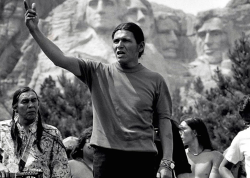
IPR is featuring research and some of the many Native American pioneers who have had an impact on the world in celebration of Native American Heritage Month.
Dennis Banks was born on April 12, 1937, on Leech Lake Reservation in Minnesota. At 17, he ran away from a boarding school for Native children to join the U.S. Air Force. After being discharged in the late 1950s, he moved to Minneapolis, Minnesota, where he faced challenged reconnecting with his culture and became involved in crime.
Following his release from prison in 1968, Banks partnered with Clyde Bellecourt to establish the American Indian Movement (AIM). AIM focused on protecting Native American rights and preserving Indigenous culture. The movement quickly gained national attention for its advocacy efforts, including the notable Trail of Broken Treaties protest. During this event, hundreds of Native American activists traveled across the country in a car caravan to Washington, D.C., intending to meet with government officials to discuss Native American rights. When the meetings were canceled, AIM members occupied the Bureau of Indian Affairs building for six days.
In 1978, AIM and Banks created the Longest Walk, a five-month march from California to Washington D.C. to protest congressional bills that would eliminate all treaties between the U.S. and tribal nations. The walk gained one million signatures along the way, preventing the bills from passing. The march is now commemorated annually, and has been used to raise awareness for other issues relating to Native American rights.
In the mid-1980s, Banks moved to the Pine Ridge Reservation, where he became a counselor for residents with drug and alcohol addiction. Banks continued to be an activist for Native American rights up until his death in 2017.



